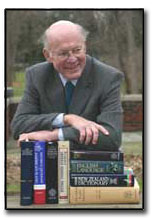Talking about Words:
Presidentess
With Prof. Richard Bailey
When the Regents of the University of Michigan
selected Mary Sue Coleman as the school’s 13th president,
there was great rejoicing. Among the many causes for celebration
was that she would be the first woman to hold that office.
Presidentess is not a term anybody thought
to use in addressing her, and, as everyone knows, gender-specific
titles are vanishing from the linguistic landscape. Waitress
(and waiter) have merged as generic server. Actress
holds on mainly because it is still used as one of the categories
for “best” acting in the Academy Awards, but few people
think it odd to say that “Meryl Streep is a wonderful actor.”
Stewardess long ago vanished into flight attendant.
In general, we seem to want fewer –ess
titles, not more, but that was not always so.
In May 1865, when the nation was reeling from
the Lincoln assassination, an author in the most popular women’s
magazine of the day, Godey’s Lady’s Book, cited
heaps of –ess words she’d found, some of them
very old like princess (which could be a woman monarch
in her own right and not just the spouse of one).
She urged the use of even more –ess
titles. Women teachers, this author observed, had proved to be the
“most efficient agents,” and therefore it would be a
good thing to introduce the title teacheress, so “efficient”
women might be readily distinguished from mere (male) teachers.
A parent seeing “Teacheress J. Avery” on a roster could
go for the gold.
Women needed to be singled out, this writer declared.
Though no women in Britain or the United States had yet achieved
the rank of professor, they might do so in time—most
likely, she thought, at Vassar College, established just four years
earlier: “We hope they will not usurp the man’s title;
but, following the analogies of our language, assume their own womanly
style—Professoress.”
The writer felt free to invent new titles with
–ess, and she was not alone in this impulse. That
same year, 1865, a British traveler in Vermont reported seeing a
sign offering the services of a physician: “Mrs. Doctress
Lacese Smith.” “See what a woman can do,” declared
this notice.
Doctress was listed in the Godey’s
essay, and its author especially recommended presidentess,
a term she thought she had created from her own imagination.
In fact, presidentess had been in the
language since the end of the 18th century, and in America it was
regularly used for the wife of a president. Dolly Madison had been
the Presidentess when her husband had held the office,
and, after she ceased living in the White House, Julia Tyler was
known as the ex-presidentess. (Only with Lucy Hayes did
first lady come into use.)
Presidentess as a title for a woman
holding office emerged as part of Mormon nomenclature at the end
of the 19th century, but the word has never had much of a grip on
the national imagination—except, perhaps, for sneering irony
attached to a woman who has the effrontery to be in charge of something!
Sorceress has some currency in the Wiccan community, but
except for princess these forms seem to have dropped down
the memory hole into oblivion.
Hardly any –ess listings are to
be found in the Dictionary of Occupational Titles maintained
by the US Department of Labor. Many gender pairs are not taken very
seriously nowadays: aviatrix and aviator, for
instance; or dudette and dude.
What remains, however, is another problem: that
is, what do you call a person whose status derives mainly from being
a spouse?
Some time ago the University convened a meeting
of its present and former “first ladies.” The term made
some people uncomfortable, however, and resulted, most likely, in
the fact that Vivian Shapiro and Anne Duderstadt are now given equal
billing with former presidents Harold Shapiro and James Duderstadt
on the buildings memorializing their years in the President’s
House.
But how should we title
Kenneth Coleman, husband of our current president?
It is theoretically possible to call him a Presidentesser
but, practically, that’s ridiculous. Sidekick (originally
Sidekicker) lacks gravitas. Significant Other,
concocted to include same-gender intimates with spouses, probably
has unwanted associations for the couple living at 815 South University
Avenue, Ann Arbor.
So there remains a restiveness in the English
vocabulary. Presidentess and First Lady sit uncomfortably
on the page for spouses who are women. Spouses who are men and dwell
with presidents are left in titular limbo.

 Richard W. Bailey is
the Fred Newton Scott Collegiate Professor of English. His most
recent book is Rogue Scholar: The Sinister Life and Celebrated
Death of Edward H. Rulloff, University of Michigan Press,
2003 - a biography of an American thief, impostor, murderer and
would-be philologist who lived from 1820 to 1871. It was
published
by the University of Michigan
Press in August. Richard W. Bailey is
the Fred Newton Scott Collegiate Professor of English. His most
recent book is Rogue Scholar: The Sinister Life and Celebrated
Death of Edward H. Rulloff, University of Michigan Press,
2003 - a biography of an American thief, impostor, murderer and
would-be philologist who lived from 1820 to 1871. It was
published
by the University of Michigan
Press in August.
|

 Richard W. Bailey is
the Fred Newton Scott Collegiate Professor of English. His most
recent book is Rogue Scholar: The Sinister Life and Celebrated
Death of Edward H. Rulloff, University of Michigan Press,
2003 - a biography of an American thief, impostor, murderer and
would-be philologist who lived from 1820 to 1871. It was
published
by the
Richard W. Bailey is
the Fred Newton Scott Collegiate Professor of English. His most
recent book is Rogue Scholar: The Sinister Life and Celebrated
Death of Edward H. Rulloff, University of Michigan Press,
2003 - a biography of an American thief, impostor, murderer and
would-be philologist who lived from 1820 to 1871. It was
published
by the 